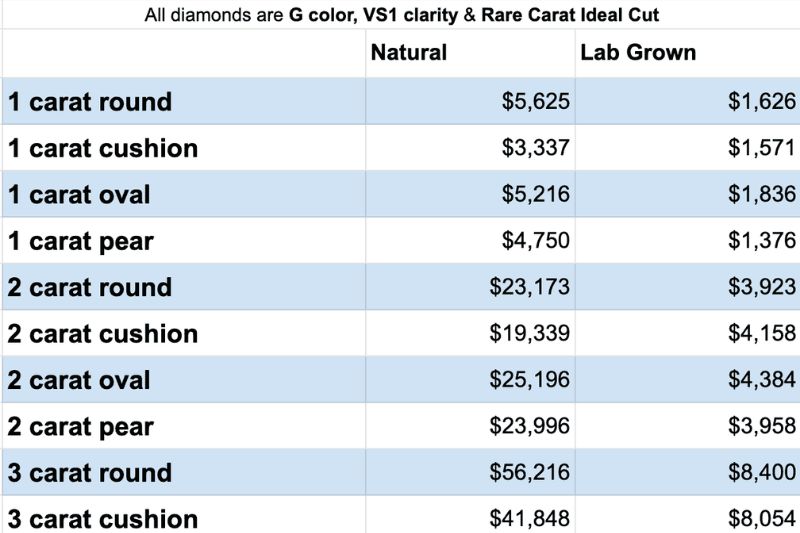No products in the cart.
Ethical Considerations: Why Choose Lab-Grown Diamonds?

If there’s one universal truth that is known throughout the world it is, that everybody loves diamonds. It is the perfect gift, the perfect family keepsake, and the perfect way to propose to the love of one’s life. Countless romantic proposals, heartfelt speeches, stunning rings, and beautiful couples have been adorned by Rare Carat diamonds. However, if there is one dark side to diamonds, it is the issues that come with them. To get a more in-depth idea of the different types of diamonds available out there visit https://www.rarecarat.com/blog/diamond-ring-tips/lab-grown-diamonds-vs-real-diamonds.
Every professional diamond retailer always welcome customer, greeting them with beautiful smiles and lavish interior decorations all to encourage consumers to shop here and not others but very rarely do these diamond retailers talk about the environmental and ethical concerns that accompany many of their natural diamonds. Here are the top ethical considerations why lab-grown Rare Carat diamonds are better.
Ethical Considerations: Choosing Lab-Grown Diamonds
Environmentally Friendly
Among the many disadvantages that come from mining diamonds from deep beneath the earth are the heavy machinery and equipment involved that not only use up a lot of fossil fuels but that often not merely disrupt but completely and permanently destroy ecosystems that took centuries if not millions of years to cultivate.
With huge pits, blasting rocks, contaminated water, and more galore. It comes as no surprise average amount of carbon dioxide emissions is 140 pounds (63.5 kg) according to Harvard Magazine. Lab-grown Rare Carat diamonds meanwhile because they are created in a lab that uses less water, energy, and land produce only 6 pounds, a sustainable and eco-friendly solution to producing diamonds that look and feel the same.
Conflict Free
If it wasn’t for the 2006 movie Blood Diamond. The vast majority of people around the globe would have never known about this dark secret of the diamond industry. Since then, numerous big publications from Forbes, NYTimes, Financial Times, and more have had reports and articles on the long history of these events that fueled for decades human rights abuse, violence, and literal wars.
Among the many benefits of lab-grown Rare Carat diamonds is the accountability Rare Carat offers from the supply chain to a traceable origin, each consumer is ensured that their diamond was produced and/or sourced ethically which never harms anyone who has followed all international diamond certification standards.
Innovative Yet Affordable
Everyone deserves a diamond. However, it comes as no surprise that diamonds have always been expensive. The bigger, more brilliant, and rarer the size of the carat is. The more expensive it is after all the word luxurious wouldn’t be associated with diamonds, if everyone could afford one but what if it was possible? What if the same big and beautiful could be had for less than 40% if not more?
This is 100% possible with lab-grown Rare Carat diamonds. Thanks to these diamonds being created in a controlled environment. The gigantic costs of the complex supply chain of diamonds – that is passed down to the customer – from heavy machinery, mining, cutting, fuel, polishing, grading, transportation, and retailing are all removed. Imagine, the size color, clarity, carat, toughness, and cut diamond for less. Incredible.
Best of all, because lab Rare Carat diamonds use cutting-edge technology not only are laboratories able to mimic the exact environments that natural diamonds are created in but also use advanced methods such as CVD (Chemical Vapor Deposition) or HPHT (high pressure, high temperature) they have greater control over the characteristics and high quality of their diamonds from color, clarity, size, and shape enable consumers to easily customize their desired diamond to their personal preference.
Socially Responsible
A large portion of companies that offer and/or support lab-grown diamonds support social causes and help communities that are often exploited by the diamond industry. With numerous donations to organizations and charities that need funding, everything from health care, human rights, education, animal welfare, environmental protection, and more. Not to mention offering fair wages and safe working conditions. These are what lab-grown diamond companies don’t get enough credit for. Shop here and buy only the best Lab Rare Carat Diamonds available in the market.
Conclusion
The reality is, that lab-grown diamonds are here to stay. And while there will always be an appetite for natural diamonds. The growing global trend of consumers demanding diamonds ethically produced is growing rapidly, especially the new generation that is more environmentally aware and technologically advanced, do not buy without making an informed decision, lab-grown diamonds are the future of the industry. Not only are consumers and retailers getting diamonds that are more affordable and possess the same characteristics as their natural counterparts but they support ethical causes and ethical sustainable productions of these timeless beauties.


















Leave a Reply